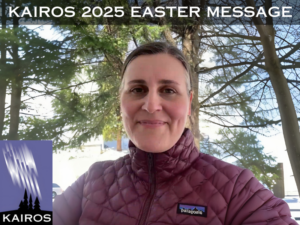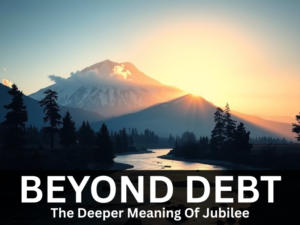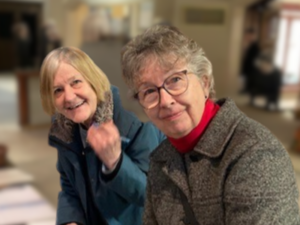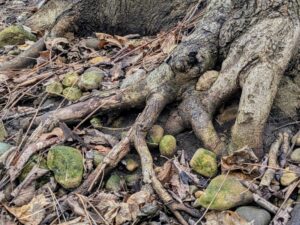Spirited Reflection: We are the ones to listen
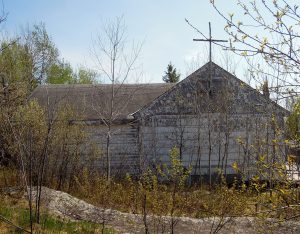
Psalm 80, Vs 3-7
Restore us, O God; let your face shine, that we may be saved.
O LORD God of hosts, how long will you be angry with your people’s prayers?
You have fed them with the bread of tears, and given them tears to drink in full measure.
You make us the scorn of our neighbours; our enemies laugh among themselves. Restore us, O God of hosts; let your face shine, that we may be saved.
The Christian Peacemaker Teams’ delegates gathered their supplies to head to Grassy Narrows First Nation. It was then that we heard of the tragedy in the community – an 11 year old had tried to take her life and almost succeeded. We thought perhaps this was not a good time to take a group of outsiders to visit our friends and partners. However, Judy da Silva said, “No, this is the exact moment for you to come. We need Christians to sit with us around the sacred fire, to grieve with us, to listen to our stories.”
The ring of logs and folding lawn chairs around the small fire was indeed a sacred place. As dusk fell upon the land, we could hear the wail of loons, and the swooping night birds, calling out as they caught their prey. The conversation was gentle, with an occasional outburst of laughter. More people quietly joined the circle and, as the night drew in, people began to share what was on the tip of their tongue, what was in their heart. In the hours that followed we heard the stories of the people of Grassy Narrows / Asubpeeshoseewagong Anishnabek.
The ones who spoke were from the most recent generations, but the stories were more universal – of generations of oppressions and trauma since the settlers came. The white men came from over the ocean, “discovering” and claiming the land that was rich in resources and empty of “significant” people. They were the ones who thought they came with the gospel – the good news of a baby born in humble conditions who had come to offer salvation. But instead, they brought the news that God was “angry with the Peoples’ prayers” – they were considered savage and evil. The gifts they brought were “the bread of tears and …. tears to drink in measure “.
We heard of unemployment – the cry of a father who wants to provide for his family, but who is one of the 85% who has no job. This was once a community rich in the resources of fish, wildlife, and medicines— food for all as well as employment for the community. But, fifty years ago, a settler company intentionally poured 10 tonnes of mercury into the river system which moved up the food chain right into the bodies of 90% of the people of Grassy Narrows. Now the fisheries are closed and there is little economic opportunity for those living on the reserve.
Teenagers quietly spoke of the friend who is lying in the hospital and of one who had succeeded in taking her life just a few weeks before. These young ones grieve the ones who have no hope of life being better and just give up.
A woman shared of the difficulty of staying dry, the day-to-day struggle of resisting the relief of the bottle. She spoke of her joy on the days that she is able to live with her own resources and how good she feels with the support of Creator through new-found traditional ways.
The oft-heard remembrances of the residential schools came again and again from the older ones who had spent years in the institutions of education designed to make the ‘Indian’ children into “good and proper Christians”:
- The schools which created adults with such trauma that they struggled to parent and were unable to pass the teachings onto their little ones;
- the institutions which made the learners the “scorn of our neighbours”
- and their teachers and overseers who saw the children as moldable beings who would make good citizens once the savageness was squeezed out of them.
We sat and listened and learned. We saw people rising and struggling and resisting the legacy that the Christians had brought and left. We saw young ones taught how to offer tobacco to the sacred fire to send their prayers up to Creator. We saw the leader hugging a very angry young man to let him know that his people are there to join him in his struggle. We were told to learn our own faith well.
We are the ones to listen to our indigenous sisters and brothers. We are the ones to keep our mouths quiet and to wait with our questions and queries to ponder in our hearts the wisdom we have heard. On this fourth Sunday of Advent we are the ones to share the good news of restoration and reconciliation and of people finding the way to Creator in the way that is good.
Kathy Moorhead Thiessen lives on Treaty One territory in Winnipeg with her husband Vic and two grown daughters who support her well in her peacemaking. She has worked with Christian Peacemaker Teams for 6 years- in Iraqi Kurdistan and now on Indigenous Peoples Solidarity team in Winnipeg. She intends to begin blogging again at goinpeacenottopieces.blogspot.com.









